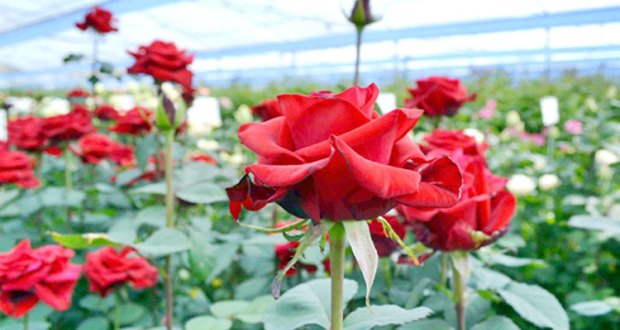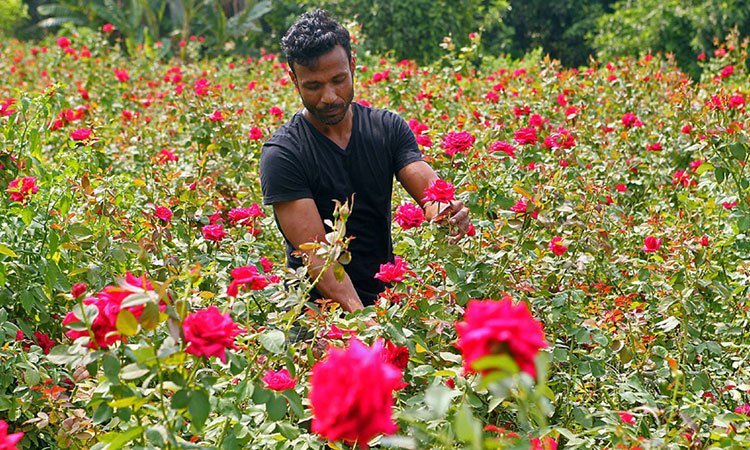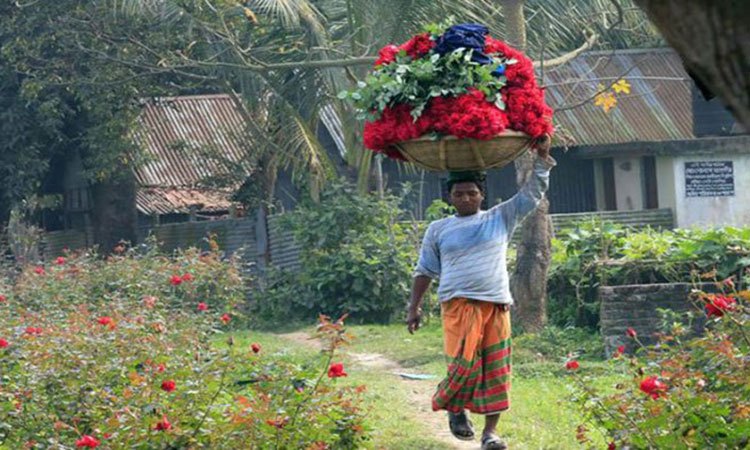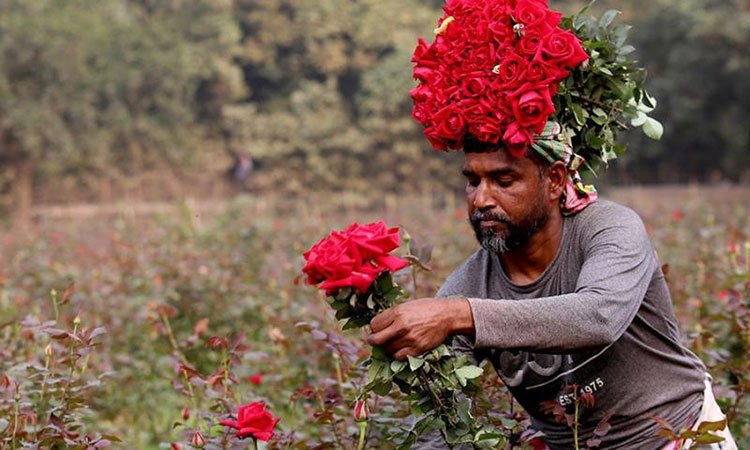Sondulapur in the rose village of Turag

The brick scraps of the village have been scratched. The rose garden has been made on both sides. The highlands are covered with roses. Red, yellow, white - how many roses have no ytti After village village same aesthetic scene. In the air, you have a taste of the flowers of the sun
Near Dhaka. Tubao patha river door Gulap, on the outskirts of the capital, has traded on commercial basis in at least six villages in the Kolaghese of Turag Nirpur in Birulia Union. There are flowers in six villages in this year. Most of the cultivation is in the village of Sadullapur. This rose farm has emerged as the main driving force of agricultural economy in this village. 90 percent of the farmers here are cultivating roses on a commercial basis. The marginal farmers are also rushing to cultivate roses.

Only 30 minutes route from Mirpur Dianbari Trawala Ghat of Dhaka, then the village of Sadullapur. Falling from the trawler rosy rosy rosy garden on both sides of the road.
In the village of Sadullapur, mainly the red rose species of the Miranda species are cultivated. For this reason the village has been known as the red rose village. There are also white rosas, gardens and gladioles flower gardens.
If you want to visit somewhere around Dhaka for a short time, there is a suitable place for Sadullapur. As you can enjoy beautiful views of the river on the journey, the beauty of the rose is also seen from near. And the whole village can be seen walking around.
Way to go: Wherever you live in the capital, first you will come to Diyabari Batalha Ghat. This is not a Diyabari but a darabari of Uttara. It is Mirpur embankment. Jatrabari, Gulistan, Farmgate has bus services to Mirpur embankment. Besides, Mirpur number one or Mirpur-10 or Gabtoli can easily go to Rikshaya Diyabari Battalola Ghat. From here, the shaleo engine has left the boat for 10 minutes and goes to Sadullapur. Speedboat, kosha boat, Shallow boat agreement can also be taken for rent in Sadullapur. The whole of Sadulapur can be traversed by walking. Again, the pitch-lined pathway through the village can also be rickshaw-mounted. The best route is the Baruilia Bridge route. Because in this way, all the rosettes in the field are on the other side of the road. Absolutely full street. Stop the auto stop and all the rose garden will be seen. If you want to take a personal car, then Akaran Bazar is straight between Birpura Bridge and Birpura Bridge. The road from the market to the path of the Rosa will be seen on the way.

Rose hat: Local flowers farmers have built themselves in the village for their own needs. Every evening in Shyampur, the rose hat is sitting. In front of the Abul Kashem Market there began the evening in the flower businessmen. There are many businessmen coming from different parts of the country including Dhaka and gathering in the crowd. To sell, sell. Until late night. Apart from this, the Sabu Market has the most in the market. Selling rosettes in this market is also bought. Later these flowers are sold in different places of Dhaka. Travelers can buy flowers directly from the garden if they want. You can take your favorite flowers. The price of the retailer is five taka. Generally flowers are sold as staples. One box contains 50 to 100 roses. Flowers and fluctuations in the price of the season. The demand for roses is always there. So the peasants are busy all year round. In the special festival days, the demand increased manifold.
Food: It is good to take lunch with you. But there are hotels near the Sadullapur Gate. You can find great food including mirchini, murali, curd, sweets, and all the great food in the gaatala boat. The cow's milk tea and milk can taste sour cream. A taste for remembering If the party is tied, then the hotel will have to talk about cooking before.
As it turns out, according to the information given by the locals, the cultivation of rosemary flowers began on experimental basis at Azpara Mostapara village of Savar around 25 years ago. The soil of the area is very suitable for cultivation of flowers, hence there is success in cultivating roses. In this region traders flourished commercially in this region. In 1981, bottles of Mirandi were brought from Holland to the Botanical Gardens in the capital's Mirpur. Soon Mirandi flower cultivation started in this country. In 1986, a researcher from Botanical Garden planted seeds of Mirandi flowers at Mostapara village. Then the cultivation and business of roses rose in the region. Later, it spread to different parts of the country including Savar, Singair.

Profit and cost: Farmers said that about seven lakhs of rupees are spent on cultivating flowers on every hectare of land including organic and chemical fertilizers, seeds, pesticides. In winter, the incidence of insects is low but it is high in summer. Because of this, pesticides have to be given. It is not possible to produce good roses without regular irrigation, fertilizer and care. There are 15 lakh flowers per year in every hectare. On average, one flower can be sold at one rupee by selling 15 lakh taka. At present, the wholesale price of flowers is three to three rupees. But sometimes every flower can not be sold at one rupee.
Everyone in the village is rented: Sadullapur village is known as Nababs Baigun House. This was the victim of the victims of the Nawab of Dhaka. There was a palace of Nawabs in the house of Baigun. There was a mosque built by Nawab Ahsanullah. Now there is nothing for them. There are only ruins of the house. The whole of Sadullapur is still under the Nawab Estate. So villagers have no own land. They are not even the owners of their homesteads. They are living in lease of estate, living in agriculture, and also cultivating agriculture. In a word, a rented village in Sadullapur. There is no such village in Bangladesh.
Warning: Do not drop plastic nets, chips packets etc. while visiting the rose garden.
Food: It is good to take lunch with you. But there are hotels near the Sadullapur Gate. You can find great food including mirchini, murali, curd, sweets, and all the great food in the gaatala boat. The cow's milk tea and milk can taste sour cream. A taste for remembering If the party is tied, then the hotel will have to talk about cooking before.
As it turns out, according to the information given by the locals, the cultivation of rosemary flowers began on experimental basis at Azpara Mostapara village of Savar around 25 years ago. The soil of the area is very suitable for cultivation of flowers, hence there is success in cultivating roses. In this region traders flourished commercially in this region. In 1981, bottles of Mirandi were brought from Holland to the Botanical Gardens in the capital's Mirpur. Soon Mirandi flower cultivation started in this country. In 1986, a researcher from Botanical Garden planted seeds of Mirandi flowers at Mostapara village. Then the cultivation and business of roses rose in the region. Later, it spread to different parts of the country including Savar, Singair.

Profit and cost: Farmers said that about seven lakhs of rupees are spent on cultivating flowers on every hectare of land including organic and chemical fertilizers, seeds, pesticides. In winter, the incidence of insects is low but it is high in summer. Because of this, pesticides have to be given. It is not possible to produce good roses without regular irrigation, fertilizer and care. There are 15 lakh flowers per year in every hectare. On average, one flower can be sold at one rupee by selling 15 lakh taka. At present, the wholesale price of flowers is three to three rupees. But sometimes every flower can not be sold at one rupee.
Everyone in the village is rented: Sadullapur village is known as Nababs Baigun House. This was the victim of the victims of the Nawab of Dhaka. There was a palace of Nawabs in the house of Baigun. There was a mosque built by Nawab Ahsanullah. Now there is nothing for them. There are only ruins of the house. The whole of Sadullapur is still under the Nawab Estate. So villagers have no own land. They are not even the owners of their homesteads. They are living in lease of estate, living in agriculture, and also cultivating agriculture. In a word, a rented village in Sadullapur. There is no such village in Bangladesh.
Warning: Do not drop plastic nets, chips packets etc. while visiting the rose garden.
No comments:
Post a Comment